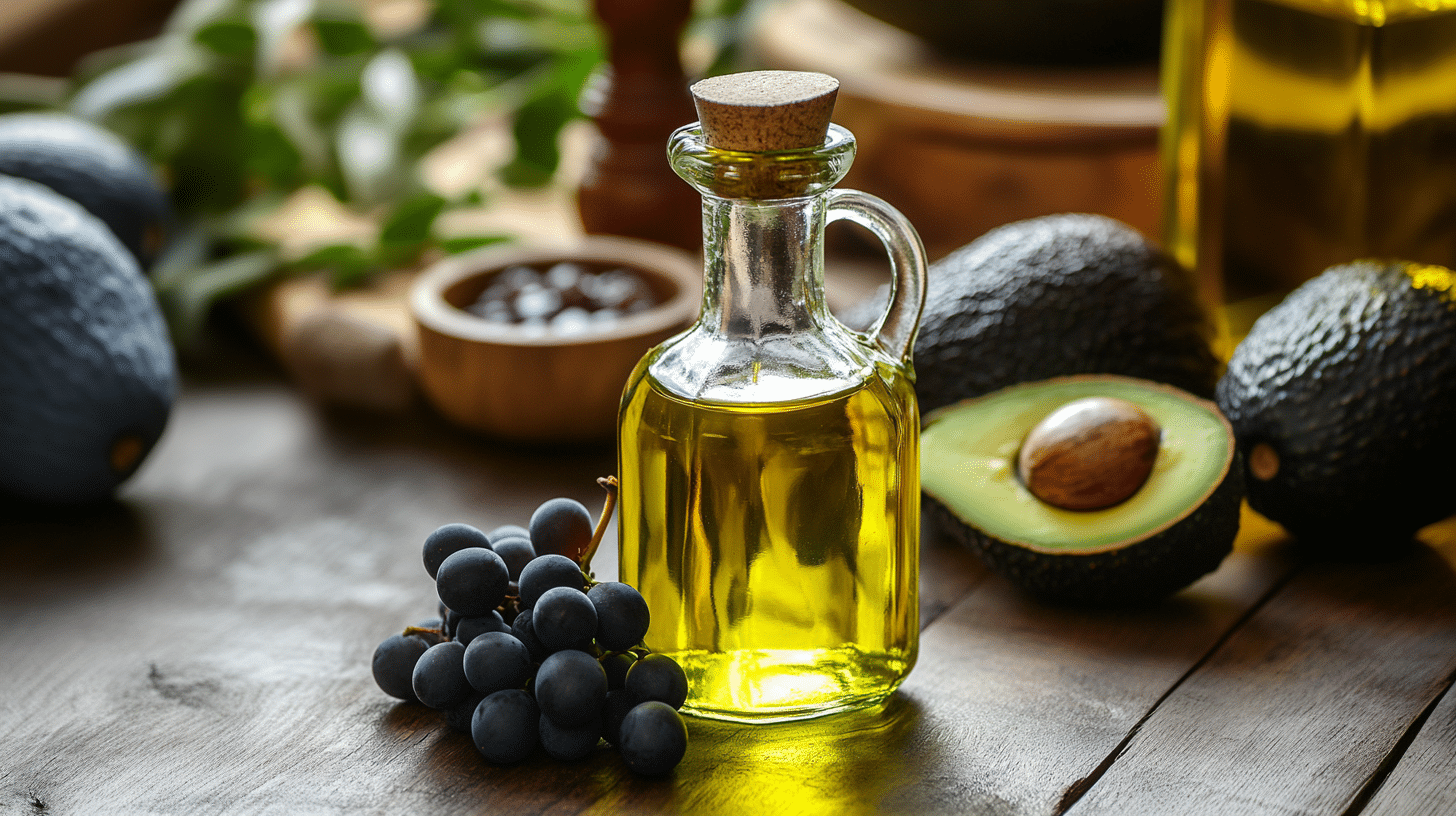When I first started experimenting with different oils in my kitchen, I was overwhelmed by the variety of options available. Grapeseed oil was my go-to for its neutral flavor and high smoke point, but I soon realized there were healthier and more versatile alternatives. In this article, we’ll explore the best substitutes for grapeseed oil, focusing on their health benefits, cooking properties, and how they can enhance your meals.
Table of Contents
Understanding Grapeseed Oil and Its Uses
What is Grapeseed Oil?
Grapeseed oil is extracted from the seeds of grapes, typically those used in winemaking. It’s known for its light, neutral flavor and high smoke point, making it suitable for various cooking methods, including frying and sautéing. However, it’s relatively high in omega-6 fatty acids, which, when consumed in excess, may contribute to inflammation.
Why Consider Replacing Grapeseed Oil?
While grapeseed oil has its merits, there are several reasons to consider alternatives:
- Health Concerns: High levels of omega-6 fatty acids can disrupt the balance with omega-3s, potentially leading to inflammation.
- Nutritional Profile: Other oils offer better nutritional benefits, such as higher levels of monounsaturated fats and antioxidants.
- Flavor and Versatility: Some substitutes provide unique flavors that can enhance your dishes, while still maintaining a high smoke point for various cooking methods.
Top Substitutes for Grapeseed Oil
Avocado Oil
Avocado oil is an excellent substitute for grapeseed oil, boasting a high smoke point of around 520°F (271°C) and a mild, buttery flavor. It’s rich in monounsaturated fats and vitamin E, making it a heart-healthy option. Avocado oil is versatile, suitable for frying, sautéing, baking, and even salad dressings.
Canola Oil
Canola oil is another viable alternative, with a high smoke point and neutral flavor. It’s low in saturated fat and contains omega-3 fatty acids, contributing to cardiovascular health. Canola oil is widely available and affordable, making it a practical choice for everyday cooking.
Sunflower Oil
Sunflower oil has a high smoke point and a light, neutral taste, making it suitable for frying and sautéing. It’s rich in vitamin E and low in saturated fat. Sunflower oil is a good option for those looking for a mild-flavored oil that doesn’t overpower the dish.
Olive Oil (Not Extra Virgin)
Regular or light olive oil has a higher smoke point than extra virgin olive oil and a milder flavor. It’s rich in monounsaturated fats and antioxidants, contributing to heart health. While it has a more pronounced taste than grapeseed oil, it can still be used in many cooking applications.
Healthier Alternatives to Vegetable Oil
Olive Oil
Extra virgin olive oil is renowned for its health benefits, including anti-inflammatory properties and heart health support. It’s best used for low to medium-heat cooking, dressings, and marinades due to its lower smoke point.
Coconut Oil
Coconut oil has a distinct flavor and is solid at room temperature. It’s suitable for baking and sautéing, providing a unique taste to dishes. However, it’s high in saturated fats, so it should be used in moderation.
Flaxseed Oil
Flaxseed oil is rich in omega-3 fatty acids but has a low smoke point, making it unsuitable for cooking. It’s best used in salad dressings or drizzled over finished dishes to preserve its nutritional benefits.
Avocado Oil
As mentioned earlier, avocado oil is a versatile and healthy substitute for both grapeseed and vegetable oils. Its high smoke point and mild flavor make it ideal for various cooking methods.
Read This: Vegetable Oil Substitute: 8 Healthy Alternatives You’ll Use Instead
Practical Tips for Substituting Oils
Understanding Smoke Points
When choosing an oil substitute, consider the cooking method and the oil’s smoke point:
- High-Heat Cooking (Frying, Searing): Avocado oil, canola oil, sunflower oil, and safflower oil are suitable due to their high smoke points.
- Medium-Heat Cooking (Sautéing, Baking): Olive oil (not extra virgin) and coconut oil work well.
- No-Heat Applications (Dressings, Drizzling): Flaxseed oil and extra virgin olive oil are ideal.
Flavor Considerations
Some oils have distinct flavors that can influence the taste of your dishes:
- Neutral Flavors: Canola oil, sunflower oil, safflower oil.
- Mild Flavors: Avocado oil, light olive oil.
- Distinct Flavors: Extra virgin olive oil, coconut oil.
Choose an oil that complements the flavors of your recipe.
FAQs
What is a good vegetable oil substitute?
Avocado oil, canola oil, and sunflower oil are excellent substitutes for vegetable oil, offering similar cooking properties and health benefits.
Can you use avocado oil instead of vegetable oil?
Yes, avocado oil can replace vegetable oil in a 1:1 ratio. It’s suitable for frying, baking, and sautéing due to its high smoke point and mild flavor.
What is a canola oil replacement?
Sunflower oil, safflower oil, and light olive oil are good replacements for canola oil, providing similar cooking characteristics and health benefits.
What is a healthy substitute for vegetable oil?
Extra virgin olive oil and avocado oil are healthier alternatives to vegetable oil, rich in monounsaturated fats and antioxidants.
What can I substitute for grapeseed oil?
Avocado oil, canola oil, sunflower oil, and safflower oil are suitable substitutes for grapeseed oil, offering comparable smoke points and neutral flavors.
Conclusion
Exploring alternatives to grapeseed and vegetable oils can lead to healthier and more flavorful cooking. By understanding the properties of various oils, you can make informed choices that enhance your meals and support your well-being.
Ressources:
1- wikipedia: Grape seed oil.
2- https://www.healthline.com/: Grapeseed Oil — Is It a Healthy Cooking Oil?
3- medicalnewstoday.com: The health and beauty benefits of grapeseed oil
